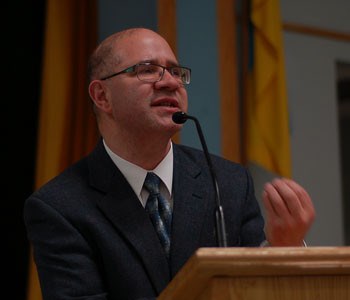A decade after the Walkerton tragedy, one resident from the Southern Ontario town is making sure the rest of the country never forgets the lessons learned from his community.
Bruce Davidson, spokesperson for The Concerned Walkerton Citizens was in Thunder Bay Wednesday night to make a presentation called "Walkerton – The Cost of Getting It Wrong". In May of 2000, human and mechanical error lead to the town’s drinking water being contaminated with deadly E. coli and other bacteria . Seven people died and thousands fell ill as a result.
"We cannot forget that there’s too high a price to be paid when we take our water for granted in Walkerton or Thunder Bay or any community you care to name in the world," Davidson.
After his presentation, Davidson said public reaction usually falls into two camps; either they decide to learn more about their drinking water or they think "it could never happen here". Davidson said the largest myth in Canada is that the country has an endless supply of safe drinking water.
"The repercussions are tremendous," Davidson said. "When you make something so far from scrutiny and revere it but don’t actually respect it you’re really going down a dangerous road."
Davidson said after the tragedy in his community, agencies such as the Lakehead Source Protection Authority along with new provincial legislation and training are helping to make drinking water safer but threats to a community’s drinking water are always present. Chemical pollution, agricultural issues and the evolution of micro-organisms such as E. coli means a community has to remain vigilant to protect it’s water Davidson said.
"Water’s a dynamic thing the threats to our water…we have to be prepared," said Davidson.
Good facilities, such as Thunder Bay’s water treatment, and good training are necessary but so are the education and awareness of average citizens. Davidson said because of Walkerton, the public has an opportunity to get involved and make sure their water stays safe.
"People have an opportunity now to be part of a process where we set the standards and the rules to protect our drinking water in a way that’s never been tried before," Davidson said. "Usually these things are dictated as bureaucratic creatures that look at the technical side but they don’t take into account the needs and the interests and the concerns of a community."
